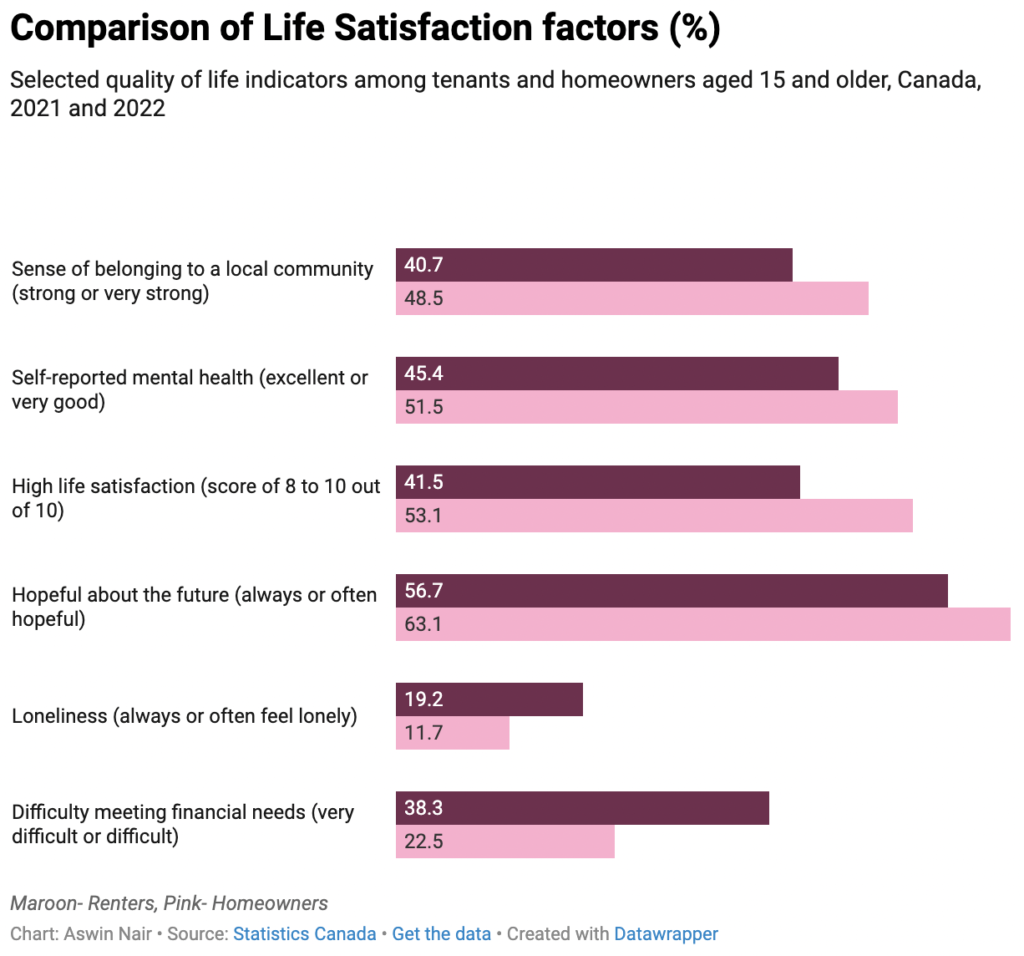

New study says young student renters feel less hopeful about their future
CanadaEtobicokeNewsToronto Mar 19, 2024 Aswin Nair

Major metropolitan cities in Canada, like Toronto and Vancouver, have dominated the news cycle over the past few years for high living costs and pricing people out of owning, leading to a decrease in home ownership.
A recent study from Statistics Canada found that renters living in these metropolitan cities report lower quality of life satisfaction than homeowners nationally. This disparity is even more evident among younger demographics between the ages of 15 and 29, who are grappling with the burden of spending far more of their income on shelter costs compared to older Canadians.
Cheryl Tien, Ph.D., a Clinical Psychologist with experience providing mental health assistance to students, says younger people living in major cities often have to juggle multiple side hustles to make ends meet. This leaves little to no time for leisure, which contributes to lower life satisfaction.
“People are struggling to survive, and we are not our best selves because if you are stressed out about paying all your bills and having a roof over your head, you wouldn’t have time to go hang out with your friends even if you wanted to,” says Tien. “We are all just going through collective trauma together, and because we are in it, it is really hard to have the empathy to support each other if we can’t take care of ourselves first.”

Comparison of Life quality factors between tenants and homeowners (2021 and 2022) Photo credit: Aswin Nair
Sora Simard, a Bachelor of Digital Communications student at Humber College, found the process of finding a place to rent in Toronto to be stressful and competitive. She also says the quality and care of the rentals are often not worth the price.
“At my previous rental, when I was faced with a pest problem, there was little to no solution by the landlord, and since it wasn’t a legal basement, the City couldn’t do anything as well,” says Simard.
One key factor used to measure life satisfaction in the study was hopefulness for the future, which was lower for renters. Simard says the “outrageous prices” for houses are a big factor.
“Honestly, I have given up the hope of ever being a homeowner in a big city, and as someone who wants to live in a bigger city, I am stressed out that even if I get a career later on if I will be able to afford it in Toronto,” says Simard. “My closest friends who don’t live in a metropolitan city are just as stressed.”
Loneliness was also observed at a higher rate in renters compared to homeowners. Tien says the COVID-19 pandemic has arrested social development skills among youth.
“In the pandemic, we disrupted social development in particularly developing and fostering relationships with people,” says Tien. “Many of my clients who come in really need a lot of support developing social skills, effective communication and boundary setting along with severe depression and anxiety that resulted out of the pandemic; those are creating this negative feedback loop where people are too anxious, depressed and lonely to be their best selves and they lost several years of social skills development to actually learn how to interact with other people.”
Tien adds that people living in bigger cities face separate challenges due to the large population, where it is easy to get lost in a sea of people.
“Luckily, I have not found it difficult to make friends and connections because of the smaller class sizes at Humber, which makes it easier to meet people; however, somewhere like UofT, where they have classes that are the size of an auditorium, it can be hard to form those meaningful connections,” says Simard.
Tien says that the best approach is to be involved in the community through volunteering, going to socials, or even routinely going to your favourite local coffee shop or library. She says she often shops in person at her local library in her city instead of buying books online.
“In big cities, it is easy to stick to your bubble, but making a concentrated effort to actively engage in community spaces through volunteer efforts or routines through which you invest back into your community is important and can make a person feel connected,” says Tien.
